Did you know that the number of people applying for visas to migrate abroad has skyrocketed by 300% in the last year? It's an astounding trend that's capturing the world's attention. But what's driving this migration wave?
In a world reeling from unprecedented changes, the chance to start afresh in a new country feels more enticing than ever. Whether it's for work, education, or a better lifestyle, the appeal of overseas opportunities is soaring. But how can you successfully navigate the complex visa application process?
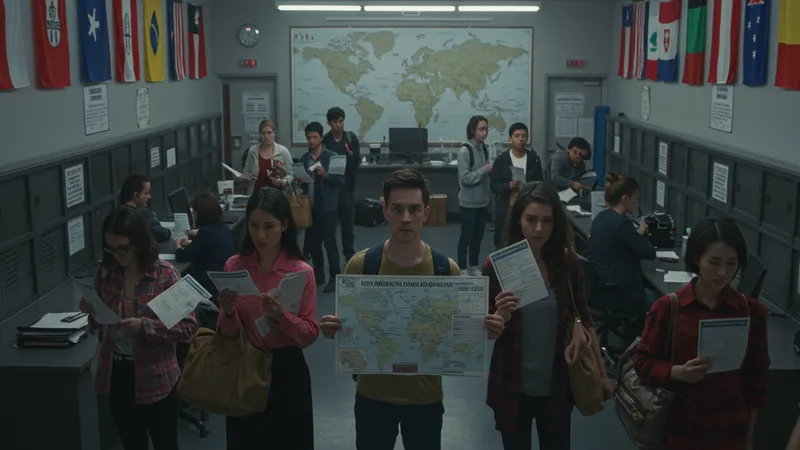
Surprisingly, some applicants have discovered loopholes that bypass the usual red tape, cutting processing times drastically. These secret pathways have remained largely under the radar until now. But that's not even the wildest part…
On the flip side, common myths about migration are misleading countless hopefuls down dead-end paths. Did you know that many of the perceived 'easiest' countries to migrate to are also the most restrictive? This counterintuitive reality leaves many in disbelief. But the shocking truths don’t end here…
If you're eager to discover the secrets and pitfalls that could define your migration success or failure, what happens next shocked even the experts…
The maze of visa applications is notoriously complex, but there are some hidden shortcuts that can make a world of difference. Some countries offer special fast-track visas for applicants with highly demanded skills or for those entering specific industries. For instance, those with expertise in digital technology could be fast-tracked in tech hub cities.

A frequent flyer visa could also open doors for frequent travelers. If you often travel for business, certain countries reward you with preferential treatment, expediting your visa process. However, few know about this perk, which remains one of the best-kept secrets in global mobility.
But there's one more twist to consider. Several countries have introduced programs allowing foreigners to acquire residency through investment. While this might sound too good to be true, these golden visa programs require significant financial commitments, providing residency in exchange for investments in real estate or government bonds.
Moreover, as technology evolves, eVisas are becoming a game-changer. This digital replacement for traditional visas is transforming travel by reducing the need for embassies’ lengthy paperwork processes. But the innovation doesn’t stop there; what's next on the horizon might reshape migration applications forever.
When planning to migrate, most applicants overlook the hidden financial burdens that come with crafting the perfect visa application. Aside from obvious costs like application fees, there are often unanticipated expenses such as translation and notarization of documents, which can quickly add up.

Additionally, health insurance is a commonly underestimated cost. Several countries require comprehensive health insurance as part of their visa approval process. This mandatory requirement can be a shock to those who only budget for the initial application fee.
Some migration processes might also imply relocation costs involving high shipping fees for personal belongings or storage fees required if moving abroad temporarily. These costs can sneak up on unsuspecting applicants, derailing even the best-laid plans.
But the financial surprises don’t end here. Taxes and currency fluctuations also play a significant role when calculating the cost of moving and living abroad. Yet what you read next might change how you see this forever.
With countless countries vying for skilled migrants, choosing the right destination can be overwhelming. While Canada and Australia stand out for their straightforward processes and welcoming attitudes, they present challenges like harsh climates and high living expenses.
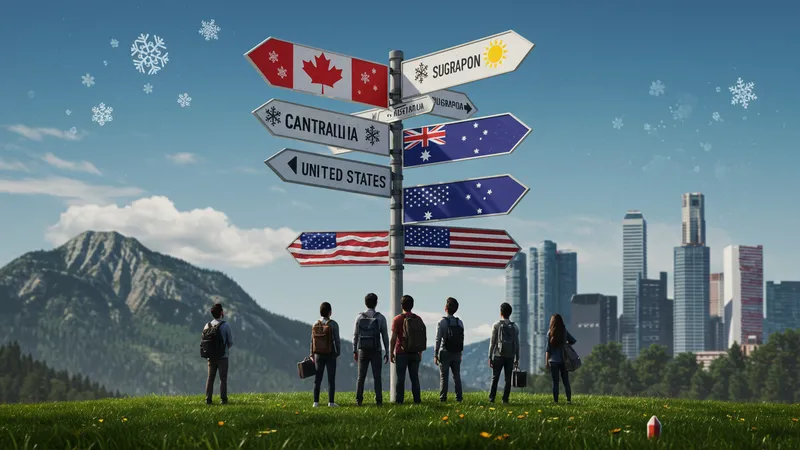
The United States remains a top choice for many, but visa lotteries and a shifting immigration policy landscape can make planning difficult. For business professionals, Singapore's efficient bureaucracy is appealing, yet its strict policies and high cost of living are often deterrents.
In Europe, countries like Germany and Sweden offer strong employment prospects and high living standards, but language barriers can be a significant hurdle. Consider your profession and lifestyle preferences when deciding, as each destination offers unique pros and cons.
As we dive deeper, one destination offers an unexpected advantage that surprises many would-be migrants. What comes next might sway your plans in a way you didn’t anticipate.
Technology has revolutionized visa applications, simplifying processes that once took months to complete. Online portals have replaced in-person appointments, reducing the bureaucracy drastically. Applicants can upload documents, track progress, and even receive approvals directly via mobile apps.

Artificial intelligence also plays a pivotal role by reviewing documents for errors, preventing delays caused by common mistakes. Bias detection in some systems ensures that every applicant receives a fair chance, regardless of origin or background.
Moreover, virtual reality tours of potential new homes are helping people make informed decisions without setting foot in a country before migrating. Yet the digitalization doesn’t stop here. The upcoming technological shifts promise even more game-changing benefits.
But as always, there's a flipside. Dependency on technology can lead to gaps where human intuition is needed. So where does technology overreach, and where is it most effective? The answer might surprise you.
Many fail to realize that legal intricacies in visa forms can make or break your application. Even a minor misinterpretation of language could derail months of preparation. Skilled immigration lawyers are invaluable in navigating these potential pitfalls, offering insights that could dramatically increase your success rate.

A post application audit is another strategy savvy applicants employ to increase their approval chances. This final review by professionals often catches unnoticed issues that might lead to rejection if left unaddressed.
Furthermore, aligning your application with immigration policies can significantly enhance your success. Seasonal fluctuations in policy leniency can affect the outcome of your application, making it essential to time your submission accurately.
Yet, there’s a deeper level of understanding that’s often ignored. How can knowing foreign immigration policy cycles advantage your application? The insight that follows unveils a crucial, strategic approach.
Migrating isn’t just a legal and logistical ordeal; it deeply impacts one’s mental and emotional well-being. Leaving behind family, adapting to new social norms, and the pressure to assimilate can lead to feelings of isolation and anxiety.
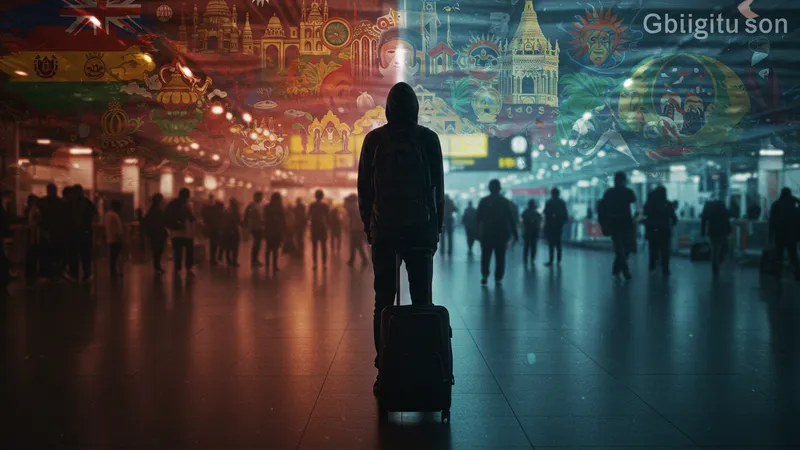
The potential for culture shock shouldn't be underestimated, especially when moving to a country with vastly different customs and languages. Support systems, whether through expatriate communities or mental health services, can prove indispensable in facilitating smoother transitions.
Despite the daunting aspects, migration also offers enriching experiences, like forging a multi-cultural identity and experiencing personal growth. Such perspectives can shift the negatives into opportunities for resilience.
Still, one often-overlooked aspect remains: How does the dream versus reality dichotomy affect migrants’ mental states? The answer here might just alter your understanding dramatically.
In recent years, geopolitical tensions and changing international relations have undeniably shaped global migration trends. Brexit, for instance, altered the landscape of migration in Europe, affecting countless residents within the EU.
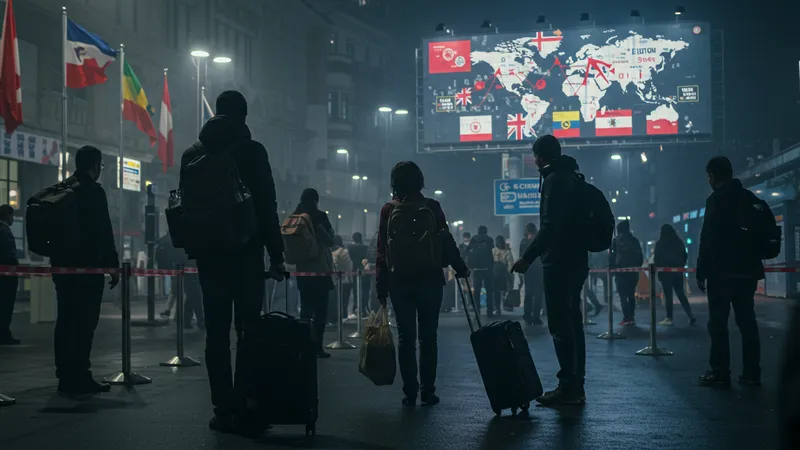
Political stances taken by major powers significantly impact migrant mobility and opportunities. Policies prioritizing specific skill sets over others have dramatically altered the skill profiles of those migrating worldwide.
Furthermore, economic sanctions and trade wars can indirectly influence migration patterns by creating unstable job markets, prompting people to seek stability elsewhere. Monitoring these shifts can offer insights into the advantages and risks of migrating.
But beyond these visible trends, how do grassroots movements and policies shift in response to macro-political changes? What happens next might completely redefine your perception of global migration.
Networking remains a powerful tool in the visa application process. Connections can pave the way for unexpected job offers, which often function as the golden ticket for visa approval under skilled migration categories.

By connecting directly with potential employers, applicants bypass common hurdles and receive insights into what employers are truly seeking. Insider tips can differentiate your profile from countless others, providing a competitive edge.
Expatriate communities online also provide invaluable advice on navigating cultural and legal issues, helping new arrivals settle swiftly. Leveraging these networks accelerates integration and eases the migration experience substantially.
But how does one effectively build and capitalize on such networks? The strategies detailed next might just be the ultimate blueprint for migration success.
Behind every successful migrant is a story of perseverance and sometimes unexpected serendipity. Take the tale of the underdog; a young freelancer who capitalized on an unexpected gig offer, leading to a full-time position abroad.

Then there are those who turned personal adversity into triumphs in new lands. Stories of once-war-torn residents find refuge and prosperity in peaceful sectors highlight resilience and transformation.
Many success stories feature themes of community; collective groups carving niches in foreign territories subsequently become lighthouses guiding future migrants to success.
But the narrative doesn’t end there. Unseen challenges behind these triumphs reveal vital lessons hidden beneath the surface. What’s revealed next will provide untold inspiration.
The future of migration points toward increasing flexibility, with countries adapting policies to attract global talent amid competition. Remote work visas have emerged as a futuristic concept, enticing workers to relocate while maintaining their original employment.
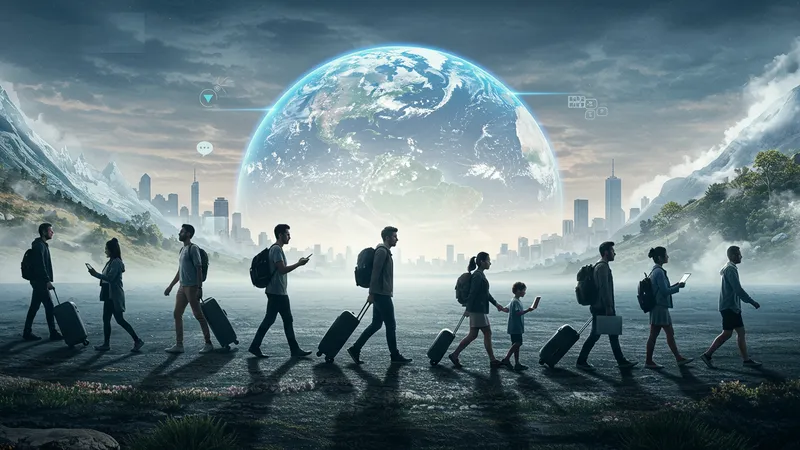
Environmental factors, too, will profoundly influence migration patterns. Climate change-induced events are likely to drive numerous relocations, altering traditional migration hotspots.
Virtual citizenship could revolutionize traditional concepts of national identity, providing new avenues for global mobility previously imagined only in science fiction.
The transformative potential continues with technology’s rapid evolution, promising even more streamlined and accessible pathways for migration. The future of moving across borders might become more seamless than ever before.
Visa rejections are daunting, yet they often result from avoidable oversights. Consular officers look for red flags in financial stability or discrepancies in applicant documentation, severely impacting the outcome without careful preparation.

Understanding denial reasons presents an opportunity to strengthen future applications. Addressing reasons for rejection is crucial; for example, those denied due to insufficient funds might leverage co-sponsors in reapplication.
Each denial holds lessons that can turn into stepping stones toward eventual success if analyzed properly. However, persistence and adaptability are key to overcoming setback narratives.
But what's truly interesting is how rejection stories unveil unconventional pathways to victory. Could the detour be the secret to achieving long-awaited residence? The insights that follow might just surprise you.
Migrating with a family presents unique challenges and requires meticulous planning. Education is often a primary concern; researching schools and understanding education systems of the destination country is vital.

Balancing both parent’s career prospects with familial obligations can test decision-making resilience. Assessing local job markets and potential work-life integration ease transitions into new environments.
Immersing children into new cultures through language acquisition and community involvement mitigates homesickness and fosters adaptation, creating positive foundation experiences.
Yet, the cornerstone of family migration success lies in how members psychologically prepare for the journey. How does a shift in mindset transform potential stress into a unified experience of growth? What follows reveals the transformative power of shared purpose.
Cultural champions are pivotal in the adaptation process for new migrants. These local or expatriate leaders facilitate cultural exchanges enhancing deeper integration into societies.

By offering cultural workshops, language classes, and networking opportunities, they bridge knowledge gaps that newcomers might experience, accelerating assimilation.
Beyond these pragmatic approaches, champions foster inclusivity, ensuring migrants feel accepted, respected, and engaged, ultimately resulting in stronger communities.
The role of these champions is expanding, offering significant opportunities for future migrants. Could becoming a cultural champion boost your integration or that of someone you know? The potential impact might profoundly change your perspective.
Migration isn't only about the promise of a better life; it's an adventure brimming with challenges and new experiences. Stepping beyond comfort zones offers unparalleled growth, fostering resilience as you navigate unknown terrains.

Varied cultural interactions enrich understanding and appreciation of global diversity, while developing a pioneer spirit redefines perspectives on what’s possible.
Ultimately, grasping the full potential of migration as an unfolding adventure takes courage and tenacity. It's not merely a physical relocation but a journey of the mind and spirit.
Yet how does embracing migration’s adventurous nature fundamentally reshape one’s outlook and legacy? What unfolds may redefine your sense of purpose, leaving an indelible mark on your life's journey.
As we draw this exploration to a close, one truth stands clear: migration is not merely a move but a transformative storytelling journey—both individually and collectively. Whether you're contemplating the leap or supporting someone who is, sharing these insights enriches us all. Pass it along, bookmark it, and begin writing your own incredible migration story today.